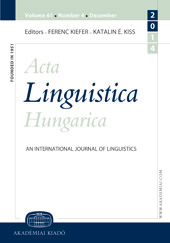Historical sociopragmatics: a new approach to the study of the history of Hungarian
Historical sociopragmatics: a new approach to the study of the history of Hungarian
Author(s): Zsófia SárosiSubject(s): Pragmatics, Historical Linguistics, Finno-Ugrian studies
Published by: Akadémiai Kiadó
Keywords: Middle Hungarian; pragmatics; traditional historical linguistics; spoken language; language system vs. language use;
Summary/Abstract: The point of departure of this paper is that it is both timely and imperative to renew the traditional systemic approach to historical linguistics primarily focusing on Ancient Hungarian and Old Hungarian and supplement it with usage-centred research based on Middle Hungarian sources (like records of evidence in witchcraft trials). One possible way of doing that is offered by historical (socio)pragmatics, a line of study little known at present within Hungarian linguistics. Although a systematic application of (synchronically tried-and-true, all but classical) pragmatic theories and methods to historical material may come up against unforeseeable or even unresolvable difficulties, such „experimentation” is a promising enterprise: the pragmatic point of view and the theories built on it may provide historical investigations with a framework that can not only be expected to yield new conclusions but also to throw new light upon familiar facts of language history. The title of this paper raises two questions: 1. Is a new approach to the study of the history of Hungarian needed at all? and 2. What is historical sociopragmatics? In what follows, I will try to answer both questions in that order.
Journal: Acta Linguistica Hungarica (Since 2017 Acta Linguistica Academica)
- Issue Year: 50/2003
- Issue No: 3-4
- Page Range: 435-456
- Page Count: 22
- Language: English

